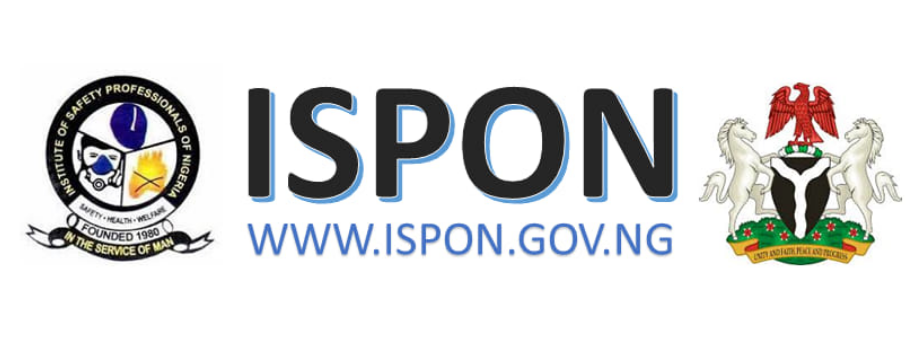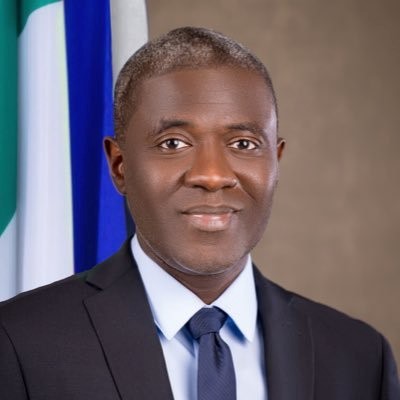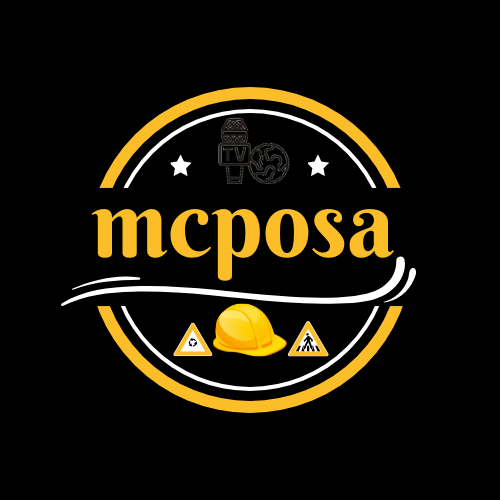The days for jostling for foreign certifications for relevance and global acceptance may soon be over for safety professionals in Nigeria if Institute of Safety Professionals of Nigeria, ISPON, comes real with her claims in this expose.

A recent check on the Institute by SSWatch reveals a new training curriculum that is poise to upgrade the standard of its certificates and place it at par with its peers internationally.
ISPON by its 2014 Act, is the nation’s regulator and trainer of Safety professionals in the country. However, rather than fast track this roles, happenings in the Institute seem to indicate that the ISPON Act unleashed endemic crisis that graced the Act. Currently, the Institute is grappling with three different factions which seem to make moves by some genuine professionals for unification a far cry.
One would have looked up for more concerted efforts towards unification rather than a faction planning and working out modalities for global recognitions and acceptance via a beefed up curriculum, but President of the ISPON faction championing the upgrade, Kaizer Ebiwari says no backing his decision with facts that, waiting for peace and a one united ISPON can be going on side by side professional developments. More so, Kaizer expressed the opinion that those causing the problems of the Institute by fueling divisions are questionable professionals saying that they are propelled by selfish interest rather than professional interest.
Furthermore, Kaizer said that ISPON Act gave the Institute the mandate to collaborate with institutions and parastatals in ensuring a safe practice, safe environment, safe systems and processes especially of the personnel, as well as to set standards of practice for safety. To do this effectively, he maintains that ISPON should be well positioned professionally and otherwise hence the need to up its standard via a new globally acceptable curriculum becomes imperative.
He also dismissed the crisis saying that one cannot set crisis as a baseline but instead should find a way to drive one’s vision.
For this reason, the Institute activated its Standards and Accreditation Committee headed by Dr. Julius Akpong, a brilliant and rounded professional who has in his kitty most of the coveted international certifications as well as domestic certifications to bring the wealth of their experiences and knowledge to bear in leading the way to a new curriculum for ISPON.
The Quality Assurance Committee was also activated to ensure that the end product meets the desire for the curriculum just as the Institute has also retrained some of its trainers to fit into the delivery of the new curriculum.
Speaking with the Curriculum Committee team lead, Dr. Akpong, he disclosed that ISPON needs a new curriculum because times are changing; the professional landscape is evolving with new ideas and operational principles just as standards and procedures of operation within the occupational safety and health space are all evolving. It is his view that ISPON owes upcoming safety Professionals access and knowledge of contemporary practices in the profession, hence, the need for the new curriculum which has been rolled out.
According to him, the curriculum is set to raise people who are aware of global standards and can effectively act locally and also suitable for global occupational health and safety industry.
On the unification of ISPON as a priority, Julius maintains that, at all times, unity is to be preferred to everything else a reason why according to him; Mr. Kaizer Ebiwari while engineering the several reconciliation efforts, at the same time ensures the division does not erode the professional leadership role charged in the ISPON Act 2014.
He also revealed that several awareness sessions have been organised and are still being organised to inform the public on the current changes that have been introduced as he enjoins members of the public and Safety Professionals to use the opportunity offered by the new ISPON curriculum to up their safety skills by undergoing the ISPON levels 3,4 and 5 courses which enable them to grow in professional knowledge and cadre.
On his part, the Registrar of the Institute, Adam Otite, explains further saying that the erstwhile ISPON curriculum reflected more of safety in the oil and gas industry saying that safety is life hence the need for a new curriculum that is all inclusive by capturing the safety needs of all sectors including the informal sector.
According to Otite, before now ISPON had General Health, Safety and Environment, GHSE and Level Three (3) HSE. The new curriculum has Levels 1 and 2 for mainly the informal sectors for basic HSE knowledge. With just GCE or WAEC or Senior secondary school certificate, one can access HSE at this HSE appreciation level. The Registrar describes the current Level Three as supervisory HSE whereas Level Four refers to management HSE and while the final cadre Level Five, Otite disclosed is Executive HSE meant for HSE implementers.
Otite also told SSWatch that the new curriculum introduced some soft skills like Emotional Intelligence which was not there before.
While some States’ Branches of the Institute are treading cautiously with the new curriculum, a Branch like Lagos has already hosted and graduated its first beneficiaries of Level Three students in line with the new curriculum.
The Branch Chairman of Lagos ISPON, Olusola Ogunleye, sharing his experience told SSWatch that a new curriculum for the Institute was long overdue saying that for almost 20years after the major review and the introduction of the General HSE (GHSE) component, no other major review had taken place. Shola disclosed that the only attempt at updating he could recall was largely an internal arrangement like in 2020/2021 when Facilitators in Lagos Branch discarded the old manual and produced training slides to reflect the realities of the time.
He therefore described the current review of curriculum under the leadership of President Kaizer Ebiware, as holistic, comprehensive and quite futuristic. It took two (2) solid years of planning, reviews, engagements with professionals and industry stakeholders, to arrive at the new curriculum which will meet the need of the various sectors of our national life in terms of training and Human Resource Development in HSE practice and management.
Shola observed that implementation was a major task following its development hence according to him, it is a case of marrying theory to practice.
Expectedly, as a novel development, it affected administrative processes including logistics approach and cost. In his words; it is needless to state that high level of inflation in the economy at the time of implementation was a major disincentive as the price tag for the programme was unable to meet the direct and indirect cost of running training. However, as an Institute committed to National Development and not just about pecuniary interests, we had to look for ingenious means to ensure we are able to deliver on our promises and add value to the profession, Shola told SSWatch.
On the practical experience of implementing the curriculum, Shola described the experience as fulfilling in the sense that by the grace of God, we were able to actualize the dream of lifting our system from where we were in the old curriculum to a new height, and that is just the starting point. We hope to continuously uplift the standards.
In clearer terms, Shola said the Branch’s approach to training delivery has changed, and so has its training evaluation system. These have brought on additional workload and responsibilities but we are working round the clock to simplify and improve efficiencies through automation and system reviews.
L-r: Firefighting equipment presented by Mr. Modestus Eze to Lagos Branch Chairman, Shola
He noted that the set made an exciting impression when for the first time in the history of ISPON Lagos, a set of trainee makes presentation to the Branch as a demonstration of their sense of fulfilment for the robust engagement with them. Furthermore, on learning that the Branch is also shopping for training materials, a member of the set, Modestus Eze donated fire-fighting equipment to the Branch. These Shola sees as quite stimulating.
According to Shola, another surprise is the fact that Participation at the inaugural session was huge contrary to expectations.
The revision of the erstwhile curriculum by the Institute and the implementation of the new curriculum has shown that the Institute as one with the capacity to live up to its responsibility as enshrined in the ISPON Act 2014 despite its unfortunate crisis.
What the new curriculum seems to have established is to set up a robust platform for HSE Manpower development that will meet the yearnings and aspirations of the public and private sectors of our economy and national life. It will prepare Nigerians and non-Nigerians practicing within for professional success while positioning them to take their rightful place in the global market place.
As a chartered professional body, the new curriculum will strengthen the confidence of its stakeholders in ISPON being a forward-looking body, able to continuously uphold standards.
The Institute under the leadership of its President and Governing Board are not seeing this successful implementation of the new curriculum as an end but as a journey that has just begun and careful observations are being made for areas of improvement.
I believe that one of the areas of focus is for this curriculum and other standards of ISPON to become a global brand, and a major pre-requisite for professional engagement in the field of HSE practice and management.
Furthermore, just as in other climes, foreign certifications will eventually take a back seat on account of the precision and accuracy that will result from the ongoing dogged efforts at Standardization and Accreditation; and other nations will see the need for Memorandum of Understanding or any other forms of legal instruments that will create an international window for ISPON certified professionals to seamlessly practice across borders.
On harmonization, going by the different factions that plaque the Institute at the moment, the President, Kaizer, does not sees as a challenge saying that a time will come when all certificates has to be re-issued to reflect a common institutional identity a reason why he disclosed that even with the crisis his faction does not discriminate as they welcome certificates and professionals from any of the sister factions. He further explained that 80% of those factionalizing the Institute are far from being professionals as a proper understanding of true professional body would have nipped every form of faction in the bud as there are SOPs for every action.
While Lagos is savouring her experience on the new curriculum, other Branches yet to key in have affirmed that before mid-year, they too will embrace the new ISPON statute





